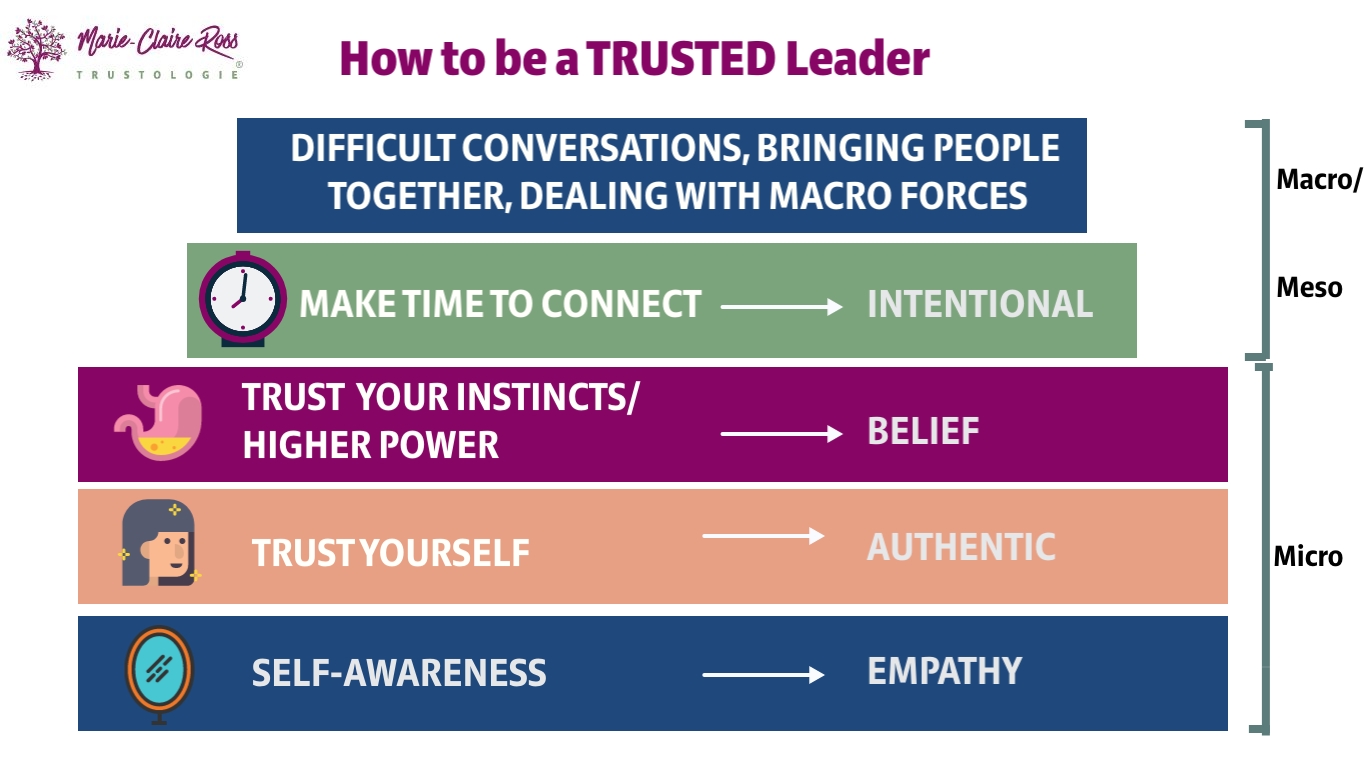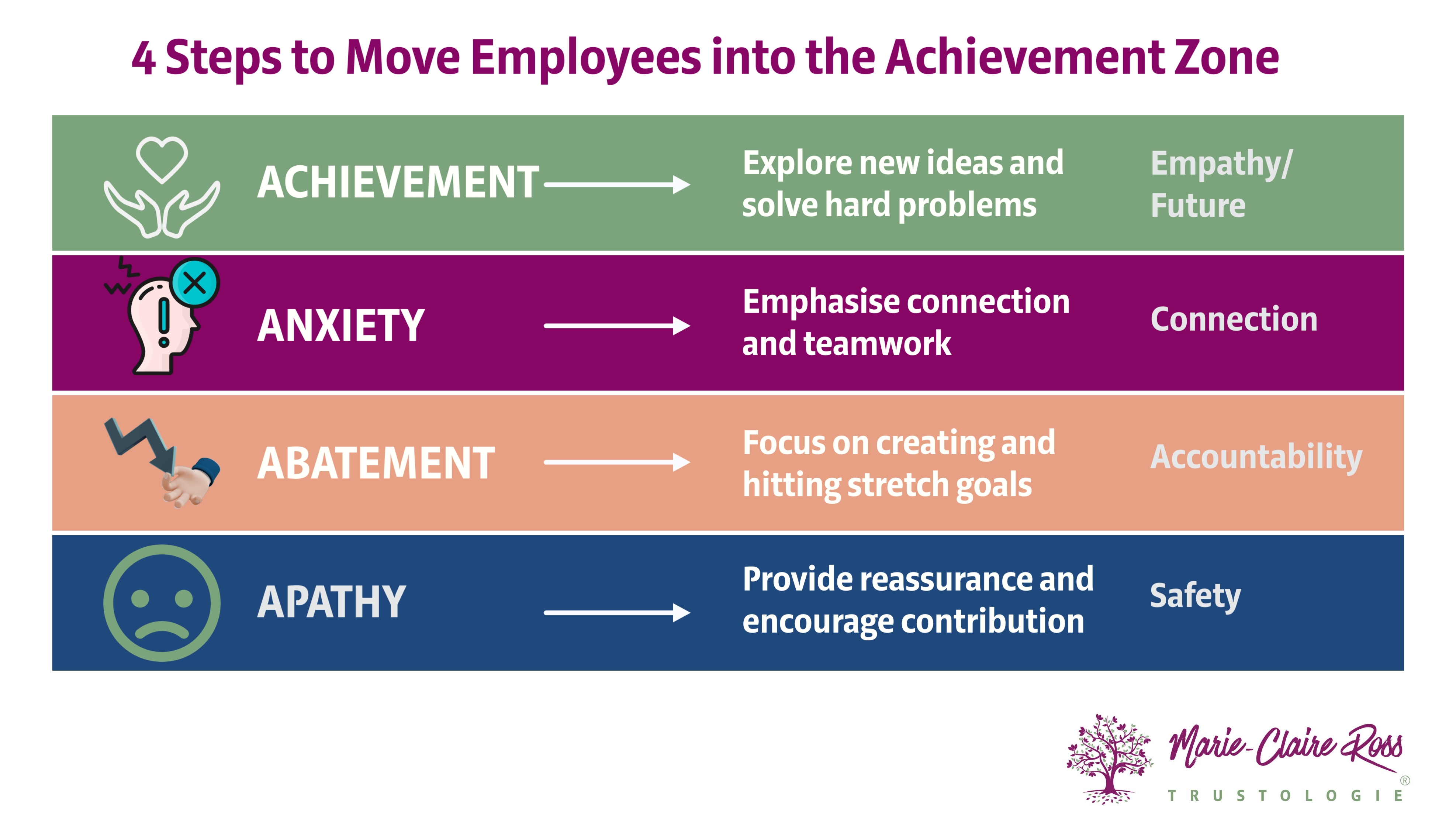9 min read
5 Ways Emotional Intelligence Transforms Your Leadership Presence Today
True leadership presence isn’t a performance or a set of charisma hacks; it is the felt experience of who you are being in the room. By cultivating...
Develop leaders, strengthen executive teams and gain deep insights with assessments designed to accelerate trust and performance.

Transform how your leaders think and perform with keynotes that spark connection, trust and high-performance cultures.

Explore practical tools, thought-leadership and resources to help you build trusted, high-performing teams.

Trustologie® is a leadership development consultancy founded by Marie-Claire Ross, specialising in helping executives and managers build high-trust, high-performing teams.

5 min read
Marie-Claire Ross : Updated on January 27, 2026
-1.jpg)
The last couple of years have seen remarkable turbulence in both the global economy and workforces. The impact of COVID is still continuing to reverberate creating trends such as The Great Resignation and Quiet Quitting.
Now, we are facing a looming recession, redundancies, inflationary pressures, continual supply chain issues and a cost of living crisis. Employees are returning to work scared and uncertain. Of course, when things are unsettling trust is low.
So as a manager, how do you ensure your people trust you? How can you help people feel that you have their best interests at heart?
Getting other people to trust us starts with trusting ourselves. This requires knowing and understanding ourselves better. Otherwise, known as intrapersonal skills ("within the self"). Intrapersonal skills are our internal abilities and behaviours that help us manage our emotions, deal with issues, work within deadlines and learn new information.
Intrapersonal skills are related to our emotional intelligence and include persistence, overcoming distractions, self-discipline, resilience and our level of self-confidence.
Taken from my book, Trusted to Thrive, you can see in the 3 Trust Forces model below that intrapersonal skills are foundational to our leadership. Strengthening our internal abilities helps us better manage the external circumstances around us.
-1.jpg?width=3947&height=2219&name=3-Types-of-Forces-that-Impact-Trust%20(2)-1.jpg)
Our intrapersonal capabilities are impacted by micro forces. These either support or oppose our leadership depending on how we react to them. They are also the only trust forces that we have any real control over. Leaders who aren't aware of how to work with these forces are more likely to be distrusted by those around them.
Managing micro forces are foundational to our leadership. Get them right and we are better able to lead our teams and work with others (interpersonal skills) and deal with the external changes swirling around us (macro forces).
The key to leading in a slowly recovering world with a hybrid, anxious or apathetic workforce relies on improving our capabilities around:
1. Empathy
2. Authenticity
3. Belief
4. Intentionality

Our intrapersonal capabilities are underpinned by our self-awareness and understanding that the only person we can change is ourselves.
Self-awareness is really about bridging the gap between how we see ourselves and how others see us.
As Dr Tasha Eurich mentions in the book, Insight, self-awareness is made up of both internal self-awareness (knowing who you are and what makes you tick) and external awareness (understanding how other people see us).
A self-aware person knows who they are, what they want to accomplish and both values and requests the perspectives of others.
While an un-self-aware person doesn’t know who they are, what they stand for or how their teams see them.
Developing self-awareness plays an important role in being more empathetic. When we understand how other people see us, we are more likely to understand others and respect their viewpoint.
Yet, our inability to be self-aware, inhibits our ability to trust those around us and the situations we face. Understanding how we operate in the world, helps us develop healthier relationships with others.
"A leader’s authenticity is rooted and grows in a field of self-trust."
Terry Kellogg and Marvel Harrison
The most important person we can trust is ourselves. When we make a mistake, receive criticism or miss a goal, it can be easy to lose trust and confidence in ourselves. We second-guess ourselves and worry that we aren't competent.
When we don't trust ourselves, other people can feel that and they automatically don't trust us.
Trusting ourselves means believing that we know what we are doing, that we have the ability to learn new things, get through difficult challenges, make friends and earn a good living.
If we fear that we aren't good enough, it can often make us defensive. We protect our egos. In a workplace, being defensive can take on a range of different forms from denying what has been said or done, lying, avoiding, blaming, gaslighting (calling the other person crazy) and verbally attacking others.
Not only that, we can often hide our authentic self because we are overly self-conscious and worried about what people will think about what we say or do.
It means we say things we think other people want us to say. We make decisions based on what we think other people want, rather than the right decision for that circumstance. It means we don't voice how we really feel. In other words, we lead with a false mask - self-censoring our words and actions and shielding people from really knowing us.
As Lyn Christian says, "Authenticity is an important part of self-trust and developing long lasting relationships. The more authentic you can be, the more you’ll learn about yourself – and the more others will learn about you too."
Improving our intrapersonal skills requires learning to trust the little voice in our head that warns us when something isn't right. In a workplace, it might be listening to our inner voice that tells us to look over some figures again, check the deliverable date or spend more time building a relationship with a particular constituent.
It also requires trusting that everything is going to work out; that we are being looked after by a benevolent force. It is irrelevant as to what higher power we believe in. What matters most is that we believe in something bigger than ourselves. This provides us with a sense of purpose, peace, motivation to change and improved wellbeing. Belief in a higher power has been proven to help drug addicts overcome their addictions.
Finally, we also need to trust others. To believe that our people and customers are doing the right things.
Known as The Pygmalion effect, research has found that when managers raise their expectations of what a direct report can achieve, they are more likely to lead their team to the achievement zone.
When we don't trust ourselves, other people or a higher power, we are in doubt and fear. Taking the time to trust the world we live in (and reducing the common fear that people are out to get us) helps us to be more calm and clear during adversity. It is anchored in having a strong belief in ourselves and our people that together we can achieve anything.
Improving intrapersonal skills involves doing the work to build trust internally with ourselves. When we create a strong core of self-belief and self-knowledge, it means that we are better at building trust externally, or with those around us.
The best way to do that is to schedule regular time to connect with people. This is an important interpersonal capability. Relationships need attention. Use this connection time to let people know that you value them, see them and that you are grateful for their contribution to the team. Otherwise, you come across as inattentive and not supportive.
Many managers will complain to me that they don't have the time to connect to each individual in their team. This might be due to rostering, work pressures or a number of other factors.
The way to get around this is to be really intentional about your connections with your team members, both individually and collectively, to improve performance.
In these moments that matter, you want to make sure you are asking the right questions to help people clear challenges, mindset issues or people problems. It requires having a system where you ask people questions to connect more deeply and efficiently.
Today, we have five generations working together. These generations have different needs, learning and communication styles and modes of working. Teams perform better when they feel supported and included. It requires trusted leaders who lead with empathy, authenticity, belief and who are intentional with how they connect with others.
Learning more about ourselves makes us more likely to understand others and lead how other people need us to lead them. Focusing on what we can do to be a better leader, rather than blaming others for not being how we want them to be, is more effective.
When we do that we get better at having difficult conversations, bringing different people together and dealing with all the macro forces that can distract us.
Remember, the only person we can change is ourselves - we can change how we react, interact and behave, as well as what we believe about ourselves and others. At it’s core, it’s about how much we trust ourselves.

9 min read
True leadership presence isn’t a performance or a set of charisma hacks; it is the felt experience of who you are being in the room. By cultivating...

13 min read
As teams return from their summer (or winter) break, you may notice subtle shifts in your team’s energy. Even if the end of year was positive, a new...

14 min read
The workplace is evolving at a pace few previous generations have seen and 2026 will mark a turning point. The Future of Work is blended, not hybrid....

One of my darkest times as an entrepreneur was winning the contract to undertake all of the audiovisual requirements at Fashion Week. It involved...
-1.jpg)
There is no doubt that COVID has changed our workplaces forever. Things will never go back to business as usual. All of us have been changed -...

Over the years, I have worked with many low trust teams to improve their performance. Repeatedly, I still see well-meaning leaders inadvertently...